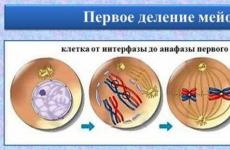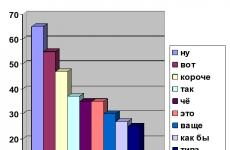Unknown facts about the Russian language. Wall newspaper on the Russian language on the topic: “Mysterious Russian word” (5th grade)
The history of the Russian language goes back thousands of years. And it is not at all surprising that previously many words to which we have long been accustomed were translated differently or even taken from some other languages. But today people are only surprised at what interesting facts there are about the Russian language.
Words starting with the letter “Y” exist!
A small but interesting fact that definitely deserves the attention of a Russian person. The fact that there are no words starting with the letter “Y” is a stereotype. They exist, although in small quantities. These are geographical names, such as Ynykchan (village), Ygyatta (river), Yllymakh (village), Ynakhsyt (village) and Ytyk-kyyol (this is the name of the administrative center of the Tattinsky ulus of Yakutia). It is interesting that all these geographical objects are located in Yakutia.
Considering unusual facts about the Russian language, I would like to note that the only word (from the multi-billion dollar list) that does not have a root is the verb “take out”. And only three nouns starting with the letter “a”. These are “az”, “maybe” and “alphabet”. But we are talking about original Russian words - the rest of the nouns are borrowed from foreign languages.
Common words and their origins
Speaking about interesting facts about the Russian language, it should be noted that the well-known word “negligence” did not originate from “robe”. In fact, it comes from a word like “khalad”. That is cold. Thus, if a person talks about something, he means that his opponent is very cool towards any matter. And the word “doctor” comes from the verb “to lie.” However, this did not mean a lie in those days. This verb was translated as “to know, to speak” in the modern sense. But “friend” is a word that comes from the definition of “another, stranger.” Today, on the contrary, people call this only the people closest to them, who have literally become family. By the way, in almost all Slavic languages “friend” sounds almost the same. In Czech and Slovak it is druh, in Polish it is drug, even in Lithuanian it is draũgas.

Longest words
Perhaps, if we talk about the most that exist, the German language will come to mind first. Indeed, a person who does not know its specifics, looking at some text, may be horrified by the length of some nouns or verbs. However, interesting facts about the Russian language say that we also have very large words. The names of chemical elements can be simply endless. One of the longest such words is “methylpropenylenedihydroxycinnamenylacrylic” (used in combination with the noun “acid”). Well, from a theoretical point of view, the length of a Russian word can be limitless. Take, for example, “great-grandmother”. After all, if you look at your family tree, then there can be a lot of prefixes “great-.” Considering this topic, I would like to note the word that was registered by the Guinness Book of Records. And that's the 35-letter definition of "overly deliberative."

Paronyms and homonyms: hell for a foreigner
Most people whose native language is Russian get confused in the use of paronymous words, which can be said about foreigners, for whom they become a real hell. Addressee and addressee, for example. Almost identical in sound and spelling, but they are absolute antonyms. The addressee is the one who receives the parcel or message, but the addressee is the organization or person sending the notification or parcel. Similar cases include the words “ignorant” and “ignoramus”. The last term defines, but the first - the ignorant, uneducated.
What about homonyms? The most popular example is a lock: for keys or as an architectural creation. The word “glass” can mean a liquid that leaks or something that is inserted into a window frame. What if entire sentences are homonyms? This is where everyone gets confused, because sometimes they can be identified by their writing (if you couldn’t catch the meaning): “We’re on friendly terms!” - "We are married"; “Awkward things” - “I’m carrying different things,” etc. The listed examples are also called homophones. Simply put, phonetic ambiguity.
Quotes from the greats

Many world-famous figures of past years and centuries loved and respected the Russian language, treating it with all respect. Some have studied it specifically and continue to master it in order to write scientific papers, defend presentations and teach. For example, Geoffrey Hosking, a famous British historian who is a specialist in Russian literature. Or Morier Abhay (Russianist from India), Oliver Bullough (British journalist of our time) and many other figures. And one cannot help but quote the great words about the Russian language, the author of which is Turgenev: “O great, mighty, truthful and free Russian language.” And, I must say, one can only be surprised at this love of Ivan Sergeevich. He was sure that a person’s true love for his homeland is impossible without love for his own language. And the great writer was right.
An insult or an old term?
Interesting facts about the Russian language tell us how the word “nonsense” came into use. It has a very interesting history, which dates back to the end of the last century. Such a famous doctor as Gali Mathieu worked in France. He treated his patients with jokes! The doctor became so popular that he even served people by mail, sending them healing puns. This is how the word “nonsense” appeared, on behalf of the great doctor. Then it was interpreted as a healing joke. But now this word is translated completely differently. Nonsense, nonsense, stupidity, nonsense - these are the synonyms people choose as soon as they hear “nonsense”.

The richness of the Russian language is in synonyms
What facts about the Russian language are known to every person? Perhaps one of these is the statement that we have the most synonym-rich language. And indeed it is. If you ask any Russian person to choose synonyms for a word, he will, without hesitation, immediately name at least five. Beautiful - attractive, stunning, luxurious, charming, enchanting... The lists of synonyms for words in the Russian language can be selected endlessly.
What else interesting things should you know about the Russian language? Perhaps synonymous phrases. Take, for example, not the most pleasant word - “die”. It is one of the richest synonyms! What can they replace it with: “give your soul to God”, “leave our mortal world”, “go to the next world”, “play in the box”, “give oak”, “stretch your legs”, “repose”. The expressions are completely different in emotional coloring and sound, but they mean the same thing. And if in the case of ordinary synonyms in foreign languages it is possible to select a translation, then it is unlikely that the same Englishmen can say “he stretched out his legs” in relation to the deceased.

Obscene expression or church term?
Unusual facts about the Russian language can tell you a lot of interesting things. Many will be surprised, but there is nothing wrong with a word like “dick”. This is exactly what one of the letters was called in the Slavic church alphabet, designated “x” in writing. Crossing out in the shape of a cross was also called by this word. And if they crossed out any place in the text, then this process was called the term “throw away”. The word has passed through the centuries, and today it means something completely different. By the way, another interesting point is that the expression “suffering from bullshit” in Russian is translated as “suffering from a hernia.” This is because “hernia” is “hernia” (from Latin). Doctors made this diagnosis for those young men who were the children of wealthy townspeople and did not want to join the army. So at the end of the century before last, every fifth Russian conscript “suffered from bullshit.” These are very interesting facts about the Russian language, after learning which you can change your attitude towards some words and teach others literacy.

Modern Russian language
Interesting facts about the Russian language are an interesting topic, but a few words must be said about a very global problem of our time. For the sake of fairness, it should be noted that today, unfortunately, not all native speakers of the Russian language can correctly use certain words in their speech. They insert terms into sentences whose true meaning they do not know, place stress incorrectly, “swallow” letters or pronounce them unclearly. And some should think about this, since excessive (and, most importantly, massive) abuse of such illiteracy can lead to the degradation of the Russian language itself. And this will be a truly global problem.
22 Interesting facts about the Russian language for a wall newspaper
- Contrary to popular belief, the Russian language does not have one word with three “e”s in a row, but two. And there are as many as 74 words starting with the letter “th” in our language. And the Guinness Book of Records records a word with a length of 35 letters. 20 Interesting and Unexpected Facts You Didn't Know About...
- Most words with the letter “F” in Russian are borrowed. Pushkin was proud that in “The Tale of Tsar Saltan” there was only one word with the letter “f” - fleet.
- There are only 74 words in the Russian language that begin with the letter “Y”. But most of us remember only “yod, yogi” and the city “Yoshkar-Ola”.
- There are words in the Russian language that start with “Y”. These are the names of Russian cities and rivers: Ygyatta, Yllymakh, Ynakhsyt, Ynykchansky, Ytyk-kyyol.
- The only words in the Russian language with three letters “e” in a row are long-necked (and others with -neck, for example, crooked-, short-) and “snake-eater”.
- In the Russian language there is a word with a unique prefix for the language - ko-zakoulok.
- The only word in the Russian language that does not have a root is take out. It is believed that this word contains the so-called zero root, which alternates with the root -im- (take out-im-at). Previously, until about the 17th century, this verb looked like take out, and it had a material root, the same as in remove, embrace, understand (cf. remove, embrace, understand), but later the root -nya- was reinterpreted as the suffix - well- (as in stick, blow).
- The only one-syllable adjective in Russian is “evil”.
- In the Russian language there are words with prefixes unique to the language and -, - total and total and a- - maybe (obsolete a vos “and vos will not be lucky”), formed from the conjunctions “and” and “a”.
- The words “bull” and “bee” have the same root. In the works of ancient Russian literature, the word “bee” was written as “bchela”. The alternation of vowels ъ/ы is explained by the origin of both sounds from one Indo-European sound U. If we recall the dialect verb to buchachat, which has the meaning of “roar, hum, buzz” and is etymologically related to the words bee, bug and bull, then it becomes clear what the general meaning of these words
- Dahl proposed replacing the foreign word “atmosphere” with the Russian “kolozemitsa” or “mirokolitsa”.
- Until the 14th century in Rus', all indecent words were called “absurd verbs.”
- In the 1993 Guinness Book of Records, the longest word in the Russian language was named “X-ray electrocardiographic”, in the 2003 edition “excessively considerate”.
- In the Grammar Dictionary of the Russian Language A.A. Zaliznyak edition 2003, the longest (in letters) common noun lexeme in dictionary form is the adjective “private entrepreneurial”. Consists of 25 letters.
- The longest verbs are “to re-examine”, “to substantiate” and “to internationalize” (all - 24 letters; word forms -uyuschimi and -hivsya 25 letters each).
- The longest nouns are “misanthropy” and “excellency” (24 letters each; word forms -ami - 26 letters each, however, “misanthropy” is practically not used in the plural).
- The longest animate nouns are “eleventh-grader” and “clerk” (21 letters each, word forms -ami - 23 letters each).
- The longest adverb recorded by the dictionary is “unsatisfactory” (19 letters). However, it is necessary to take into account that the overwhelming majority of qualitative adjectives in -y / -iy form adverbs in -o / -e, which are not always recorded in the dictionary.
- The longest interjection included in the Grammar Dictionary is “physical education-hello” (15 or 14 letters depending on the status of the hyphen).
- The word "accordingly" is the longest preposition and the longest conjunction at the same time. It consists of 14 letters. The longest particle “exclusively” is a letter shorter.
- In Russian there are so-called insufficient verbs. Sometimes a verb does not have any form, and this is due to the laws of euphony. For example: “win”. He will win, you will win, I... will win? Shall I run? will I win? Philologists suggest using the replacement constructions “I will win” or “I will become a winner.” Since there is no first person singular form, the verb is insufficient.
- To successfully master the difficult phrase “I love you,” the British use the mnemonic “Yellow-blue bus”
Do you know that in Russian the words “bull” and “bee” have the same root?
Contrary to popular belief, the Russian language does not have one word with three “e”s in a row, but two. And there are as many as 74 words starting with the letter “th” in our language. And the Guinness Book of Records records a word with a length of 35 letters.
Most words with the letter “F” in Russian are borrowed. Pushkin was proud that in “The Tale of Tsar Saltan” there was only one word with the letter “f” - fleet.
There are only 74 words in the Russian language that begin with the letter “Y”. But most of us remember only “yod, yogi” and the city “Yoshkar-Ola”.

There are words in the Russian language that start with “Y”. These are the names of Russian cities and rivers: Ygyatta, Yllymakh, Ynakhsyt, Ynykchansky, Ytyk-kyyol.
The only words in the Russian language with three letters “e” in a row are long-necked (and others with -neck, for example, crooked-, short-) and “snake-eater”.

In the Russian language there is a word with a unique prefix for the language - ko-zakoulok.

The only word in the Russian language that does not have a root is take out. It is believed that this word contains the so-called zero root, which alternates with the root -im- (take out-im-at). Previously, until about the 17th century, this verb looked like take out, and it had a material root, the same as in remove, embrace, understand (cf. remove, embrace, understand), but later the root -nya- was reinterpreted as the suffix - well- (as in stick, blow).

The only one-syllable adjective in Russian is “evil”.

In the Russian language there are words with prefixes unique to the language and -, - total and total and a- - maybe (obsolete a vos “and vos will not be lucky”), formed from the conjunctions “and” and “a”.
The words “bull” and “bee” have the same root. In the works of ancient Russian literature, the word “bee” was written as “bchela”. The alternation of vowels ъ/ы is explained by the origin of both sounds from one Indo-European sound U. If we recall the dialect verb to buchachat, which has the meaning of “roar, hum, buzz” and is etymologically related to the words bee, bug and bull, then it becomes clear what the general meaning of these words

Dahl proposed replacing the foreign word “atmosphere” with the Russian “kolozemitsa” or “mirokolitsa”.

Until the 14th century in Rus', all indecent words were called “absurd verbs.”
In the 1993 Guinness Book of Records, the longest word in the Russian language was named “X-ray electrocardiographic”, in the 2003 edition “excessively considerate”.

In the Grammar Dictionary of the Russian Language A.A. Zaliznyak edition 2003, the longest (in letters) common noun lexeme in dictionary form is the adjective “private entrepreneurial”. Consists of 25 letters.

The longest verbs are “to re-examine”, “to substantiate” and “to internationalize” (all - 24 letters; word forms -uyuschimi and -hivsya 25 letters each).
The longest nouns are “misanthropy” and “excellency” (24 letters each; word forms -ami - 26 letters each, however, “misanthropy” is practically not used in the plural).
The longest animate nouns are “eleventh-grader” and “clerk” (21 letters each, word forms -ami - 23 letters each).

The longest adverb recorded by the dictionary is “unsatisfactory” (19 letters). However, it is necessary to take into account that the overwhelming majority of qualitative adjectives in -y / -iy form adverbs in -o / -e, which are not always recorded in the dictionary.
The longest interjection included in the Grammar Dictionary is “physical education-hello” (15 or 14 letters depending on the status of the hyphen).
“accordingly” is the longest preposition and the longest conjunction at the same time. It consists of 14 letters. The longest particle “exclusively” is a letter shorter.

In Russian there are so-called insufficient verbs. Sometimes a verb does not have any form, and this is due to the laws of euphony. For example: “win”. He will win, you will win, I... will win? Shall I run? will I win? Philologists suggest using the replacement constructions “I will win” or “I will become a winner.” Since there is no first person singular form, the verb is insufficient.
To successfully master the difficult phrase “I love you,” the British use the mnemonic “Yellow-blue bus”

As they say, the Russian language is great and powerful. Today, many people no longer understand what they are writing, or rather, that they are making a lot of mistakes. But in vain. Still, when you communicate with someone by correspondence or on forums, it is much more pleasant to communicate with a person who does not make mistakes than with someone who wrote “Hello. How are you? I’ll be free today at 9.” Agree that this is not a very pleasant read. But in general, we are not studying the rules of the Russian language here, but I would just like to give some very interesting and entertaining facts about words in the Russian language.
1. There are only a few words with three identical vowels in a row, namely long-necked (short-necked, tortuous) and snake-eater.
2 . The only one-syllable adjective in the Russian language is Zloy.
3. There are two different words in Russian - Indian (indigenousAmerica ) and Indian (resident of India). But in almost all other languages these words are written and pronounced exactly the same.
4. The word "take out" has no root.
5. There are only three original Russian words that begin with the letter “A” - these are Az, Azbuka, Avos.
6. Previously, in Rus', obscene and indecent words were called “Ridiculous verbs.”
7. Many English people remember the sentence in Russian “I love you” thanks to three English words that sound similar - “Yellow Blue Bus”.
8. The longest recorded noun in the Russian language is “high excellency” (24 letters), an adverb is the word “unsatisfactory” (19 letters), the longest preposition is “accordingly” (14 letters), a particle is “exclusively” (13 letters), and the longest verb is “to be re-examined.”
9. Many people still argue about how to correctly pronounce the verb “Win” in the first person. Will I win? Or will I win? There are no such words, but philologists suggest replacing this word with “I will become a winner.”
10. Almost all words with the letter “F” are borrowed. A.S. Pushkin was very proud that in his “The Tale of Tsar Saltan” the letter “F” appears in just one word - Fleet.
11. It is believed that there are no words starting with the letter “Y”. But that's not true. Many geographical names (cities, rivers) begin with this letter (Ygyatta, Yllymakh, Ynakhsyt).
12. Now many people do not attach importance to the letter “E”, but because of this trifle another word can turn out - case and case, donkey and donkey, everything and everything, sky and palate, perfect and perfect, etc.
13. There are no such words as “NO” and “THEY”.
14. The word “Umbrella” came to us from Holland initially in a diminutive form, and only later they began to use the simple word “Umbrella”.
15. The words “Dress” and “Put on” are two different words. They dress another person, but put it on themselves. To make it easier to remember, we came up with this short memo: “They put on Nadezhda, but they put on clothes.”
16. In Cyrillic, the letter “X” was pronounced as “Her”, which is where the word “poherit” came from, which meant “to cross out on paper”, and only later did this word acquire its modern meaning of “Lose”.
The Russian language is one of the most complex and amazing languages on our planet. Its history and development are long, just like the history of our state. Did you know that there are 74 words in our language that begin with “Y”? And in the Guinness Book of Records there is a word consisting of 35 letters. People never cease to be amazed at the richness and complexity of the Russian language. We present to your attention interesting facts about the Russian language for wall newspapers.
From the names of flowers
Poets have written a huge number of poems about flowers. It is difficult to choose a favorite flower, because there are many of them and each is beautiful in its own way. However, each of us at least once in our lives tried to make a bouquet. Let's try to find out where the name of our favorite flowers came from in our language.
Let's start with the word "bouquet", which is of French origin. Each plant has its own meaning. Thus, during the reign of Empress Catherine the Great, there was a registry about flowers, thanks to which people knew that red bouquets spoke of love, and yellow ones - of betrayal. Arrangements of blue flowers were given as a sign of recognition of fidelity. However, we are not interested in the language of flowers, but in their names.
Let's talk about gladiolus. The name of this flower sounds solemn and even courageous. It is directly related to gladiators. After all, “gladiolus” translated from Latin means “sword”.
And people call it “sword” because the leaves of the flower are long and sharp, like a real sword. Did you know that “aster” translated from ancient Greek means star? The ancient Greeks gave the flower this name because it has sharp petals. They make the aster look exactly like a star. These people believed that the aster could communicate with the stars.

And we continue to consider interesting facts about the Russian language. Let's move on to the beautiful iris flower. And it is also of Greek origin. The Greeks used the word “Iris” to describe the rainbow.
But let’s leave the ancient Greeks alone and talk about the dahlia flower. It turns out that it was named after the St. Petersburg professor, ethnographer and traveler Georgi Gottlieb.
Now you can not only compose and give a beautiful bouquet, but also briefly tell interesting facts about the Russian language and flowers!
"Yellow and Blue Bus"
Do you know how the British remember the reverent phrase “I love you”? You've never heard anything like this before. In order to successfully master a difficult phrase - a declaration of love, they use a mnemonic made up of three English words: “yellow-blue bus”. Our list of interesting facts about the Russian language does not end here. And we continue to surprise you again and again.
Are you going with us into the forest to “break your lips”?
This is exactly how people in some rural areas of our state were invited to pick mushrooms. The thing is that our ancestors used to call mushrooms also lips. Philologists explained this phenomenon as follows: the mushroom comes from the ancient Slavic word for “hump.” And humps were called boletus, boletus and other mushrooms whose cap looked like a hump. Saffron milk caps and milk mushrooms were called lips, since their caps resembled lips. So in V.I. Dahl’s dictionary you can find the phrase “break your lips,” which means the modern phenomenon of “picking mushrooms.” But in the Urals and in the outback of Siberia, a soup made from such mushrooms is called nothing more than “gubnitsa”.

“By the ruble” or “I’ll chop”?
We continue to share with you interesting facts about the Russian language. This time we'll talk about money. What do you think is the origin of the proud word “ruble”? The head of the numismatics department of the Historical Museum in Moscow, Igor Shiryakov, advised us on this issue. He shared that no one still knows the true origin of the word “ruble”! For a long time it was believed that medieval ingots, cut in half, yielded two rubles. And then the Russian people realized that half is “polt”, which gave the name “poltina”. Then the ruble began to be called a whole ingot. For example, in the 14th century, a ruble ingot could buy 200 squirrel skins at once, and four centuries later, for 1 ruble you could buy 27 kilograms of fish and even meat. The interesting facts about the Russian language for the wall newspaper do not end there. And you and I move further through the expanses of our native language.

Word without root
When we were in elementary school, our first teacher told us that every word has a root, and words that have the same roots are called related. But no matter how it is! There is still one word in our native language that does not correspond to this reality! The word “take out” turns out to have no root. Linguists believe that it contains a zero root, which alternates with the root /im/ in the word “take out/im/at”. In the 17th century, our ancestors said “take out” and it had a material root, the same as in the words “take off”, “understand”, “embrace” and others. But a little later, the root /nya/ was rethought into the suffix /nu/, as in the case of the words “shove”, “blow”. These are some educational and interesting facts about the Russian language for wall newspapers.
Break the stereotype about the letter
Yes, yes, that’s exactly what we’ll try to do now! You can name a few words starting with “Y” without difficulty. However, as mentioned above, there are at least 74 of them in the Russian language. But can you remember at least one word starting with the letter “Y”? Perhaps such a task will baffle even the most well-read person. But since we are talking about this, the “Dictionary of Geographical Names of the Russian Federation” will come to our aid. It is in this book that you can find words starting with the letter that interests us. All of them represent the names of domestic rivers and cities. Get ready to listen: Ygyatta, Ynakhsyt, Ytyk-kyuel and other equally strange names.
Is physician Guillaume Guillotin really so outstanding?
We bring to your attention another interesting fact about the Russian language for wall newspapers. If you are asked: have you heard anything about the French doctor Guillaume Guillotin? Of course, you will refuse. However, this is not the case. And here's the thing! This man, as he grew older, trained to be a doctor. He had a boundless love for medicine, and therefore wanted to gain world fame and recognition. Whether he became an outstanding doctor is up to each of us to decide. If you think that the death penalty weapon guillotine and the surname Guillotin are ironically consonant, then you are greatly mistaken.

The Frenchman Guillotin felt sorry for the criminals sentenced to death. Therefore, he invented a weapon that cuts off the head, and, according to Guillotin, painlessly sends the soul of the criminal to another world. Whether Guillaume Guillotin is so talented as a doctor is something everyone decides for himself.
Finally
Our article ends. We, as promised, told you interesting facts about the Russian language for the wall newspaper. We hope that the interesting material we collected was useful to you.






